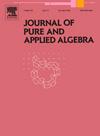Matrix invertible extensions over commutative rings. Part I: General theory
IF 0.7
2区 数学
Q2 MATHEMATICS
引用次数: 0
Abstract
A unimodular matrix with entries in a commutative R is called extendable (resp. simply extendable) if it extends to an invertible matrix (resp. invertible matrix whose entry is 0). We obtain necessary and sufficient conditions for a unimodular matrix to be extendable (resp. simply extendable) and use them to study the class (resp. ) of rings R with the property that all unimodular matrices with entries in R are extendable (resp. simply extendable). We also study the larger class of rings R with the property that all unimodular matrices of determinant 0 and with entries in R are (simply) extendable (e.g., rings with trivial Picard groups or pre-Schreier domains). Among Dedekind domains, polynomial rings over and Hermite rings, only the EDRs belong to the class or . If R has stable range at most 2 (e.g., R is a Hermite ring or ), then R is an ring iff it is an ring.
求助全文
约1分钟内获得全文
求助全文
来源期刊
CiteScore
1.70
自引率
12.50%
发文量
225
审稿时长
17 days
期刊介绍:
The Journal of Pure and Applied Algebra concentrates on that part of algebra likely to be of general mathematical interest: algebraic results with immediate applications, and the development of algebraic theories of sufficiently general relevance to allow for future applications.

 求助内容:
求助内容: 应助结果提醒方式:
应助结果提醒方式:


